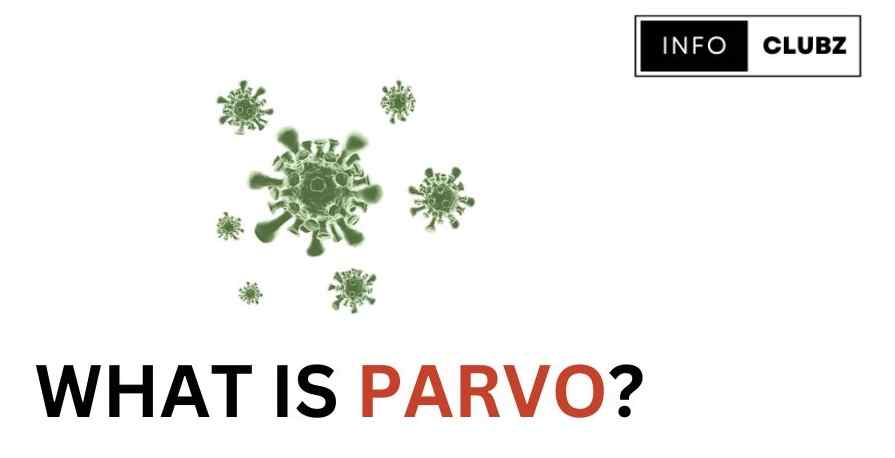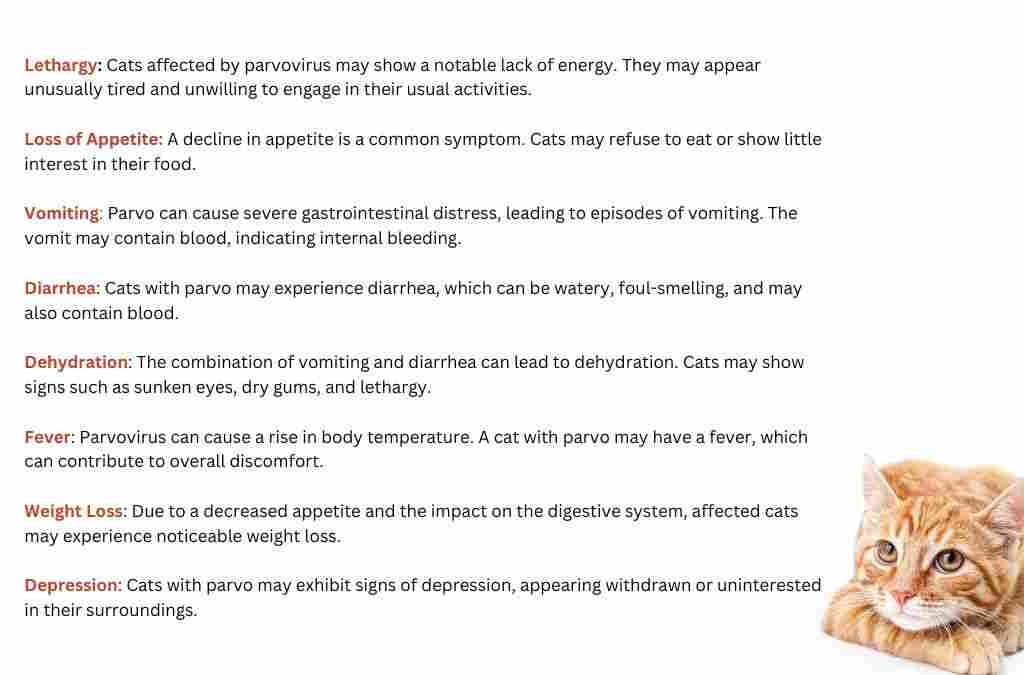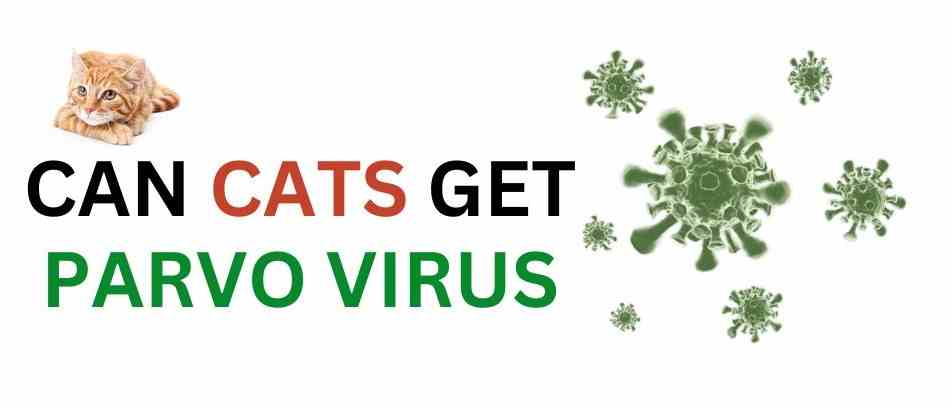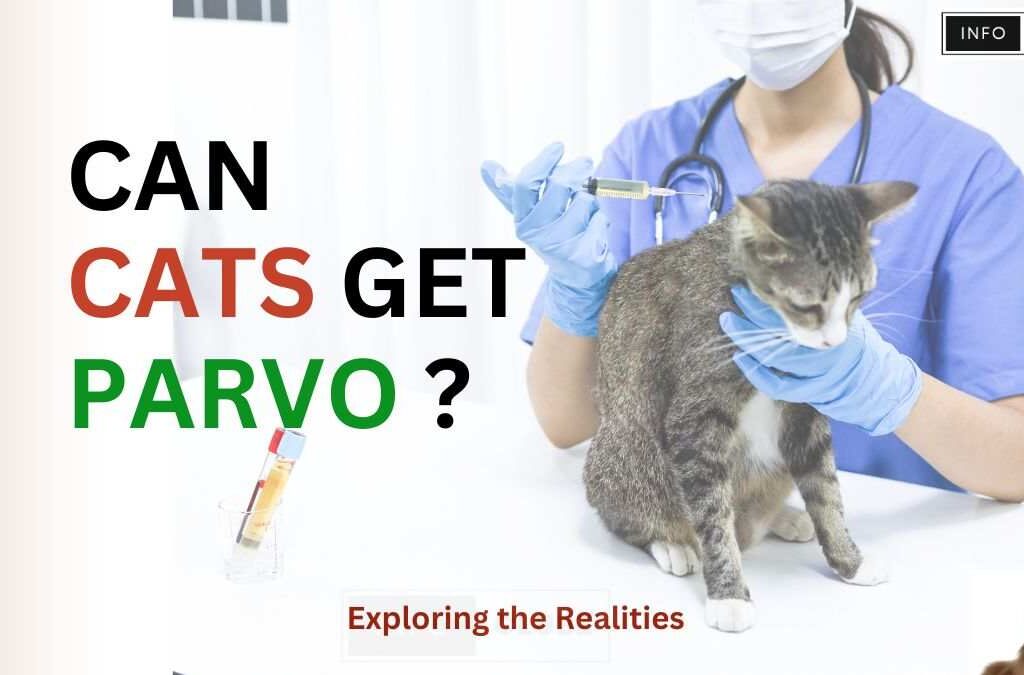Parvovirus, a notorious ailment in the realm of animal health, has garnered attention for its severe impact on dogs. But what about our feline companions? Can cats get parvo? In this comprehensive guide, we delve into the intricacies of parvovirus and its relation to cats, providing cat owners with essential insights into prevention, diagnosis, and treatment.
Introduction
As cat lovers, understanding the potential threats to our furry friends is paramount. Parvovirus, often associated with dogs, poses questions about its implications for the feline population. In this article, we navigate through the complexities of parvo in cats, aiming to dispel myths and equip cat owners with the knowledge necessary for proactive care.
What is Parvo?

Before exploring the nuances of cats and parvo, let’s grasp the basics. Parvovirus, a highly contagious virus, comes in different strains, affecting various species. Its impact on cats differs from its more recognized consequences in dogs. To comprehend the risks to our feline companions, it’s essential to understand the nature of parvovirus.
Can Cats Contract Parvo?
The million-dollar question: Can cats get parvo? We explore the susceptibility of cats to this viral menace, considering various factors that influence the likelihood of infection. Cat owners need to be aware of the potential risks to implement effective preventive measures.
Symptoms of Parvo in Cats / can cats get parvo symptoms
The symptoms of parvo in cats can vary, and it’s important for cat owners to be aware of these signs to seek prompt veterinary attention. While parvovirus is more commonly associated with dogs, it can affect cats as well. Here are some common symptoms of parvo in cats:

- Lethargy: Cats affected by parvovirus may show a notable lack of energy. They may appear unusually tired and unwilling to engage in their usual activities.
- Loss of Appetite: A decline in appetite is a common symptom. Cats may refuse to eat or show little interest in their food.
- Vomiting: Parvo can cause severe gastrointestinal distress, leading to episodes of vomiting. The vomit may contain blood, indicating internal bleeding.
- Diarrhea: Cats with parvo may experience diarrhea, which can be watery, foul-smelling, and may also contain blood.
- Dehydration: The combination of vomiting and diarrhea can lead to dehydration. Cats may show signs such as sunken eyes, dry gums, and lethargy.
- Fever: Parvovirus can cause a rise in body temperature. A cat with parvo may have a fever, which can contribute to overall discomfort.
- Weight Loss: Due to a decreased appetite and the impact on the digestive system, affected cats may experience noticeable weight loss.
- Depression: Cats with parvo may exhibit signs of depression, appearing withdrawn or uninterested in their surroundings.
Transmission of Parvovirus
How does parvovirus spread among cats? Investigating the modes of transmission sheds light on preventive strategies for cat owners. From direct contact to contaminated environments, knowing the risks helps in creating a safe space for our feline friends.
Diagnosing Parvovirus in Cats
Early detection is key to effective treatment. We delve into the veterinary procedures for diagnosing parvovirus in cats, emphasizing the importance of regular check-ups and proactive healthcare.
Cat Parvo Treatment Options
The treatment options for cats affected by parvovirus, also known as feline panleukopenia, involve a combination of supportive care and medical intervention. Parvovirus can be a severe and potentially life-threatening condition, so prompt veterinary attention is crucial. Here are some common treatment options:

- Hospitalization: Severely affected cats may require hospitalization to receive intensive care. This allows veterinarians to monitor their condition closely and provide immediate intervention if necessary.
- Fluid Therapy: Dehydration is a significant concern in cats with parvo due to vomiting and diarrhea. Fluid therapy, which involves intravenous administration of fluids, helps maintain hydration levels and correct electrolyte imbalances.
- Anti-vomiting Medications: Medications may be prescribed to control vomiting, helping to alleviate discomfort and prevent further dehydration.
- Nutritional Support: Cats with parvo often experience a loss of appetite. Nutritional support, including syringe feeding or a feeding tube, may be necessary to ensure they receive essential nutrients for recovery.
- Antibiotics: Secondary bacterial infections can occur in cats with weakened immune systems. Antibiotics may be prescribed to treat or prevent bacterial infections.
- Anti-inflammatory Medications: These medications help reduce inflammation and alleviate symptoms. However, their use is determined based on the individual cat’s condition and response to treatment.
- Isolation: Infected cats should be isolated from other cats to prevent the spread of the virus. Proper disinfection of the environment is essential to minimize the risk of transmission.
It’s important to note that there is no specific antiviral medication for parvovirus in cats. Treatment focuses on managing symptoms, supporting the cat’s immune system, and preventing complications. The prognosis for cats with parvo depends on the severity of the infection, the timeliness of intervention, and the overall health of the cat.
Cat owners should work closely with their veterinarian to determine the most appropriate course of treatment for their cat. Regular follow-up appointments and monitoring are crucial for tracking the cat’s progress and adjusting the treatment plan as needed. Early detection and intervention greatly increase the chances of a positive outcome for cats affected by parvovirus.
Prevention Strategies for cat parvo
Preventing parvovirus in cats involves a combination of vaccination, hygiene practices, and environmental management. Here are effective prevention strategies for cat owners:

- Vaccination:
- Ensure that your cat receives timely vaccinations, including the vaccine for feline panleukopenia (parvovirus).
- Follow your veterinarian’s recommended vaccination schedule to provide optimal protection.
- Indoor Living:
- Consider keeping your cat indoors to minimize exposure to infected animals and contaminated environments.
- If your cat goes outdoors, monitor their interactions and limit contact with unfamiliar cats.
- Quarantine for New Cats:
- Quarantine new cats before introducing them to the existing cat population. This helps prevent the spread of infectious diseases, including parvovirus.
- Disinfection:
- Regularly clean and disinfect your cat’s living environment, including litter boxes, bedding, and toys.
- Use veterinary-recommended disinfectants to ensure the elimination of the virus from surfaces.
- Limit Contact with Stray Cats:
- Minimize contact between your cat and stray or unknown cats, as they may carry the virus.
- If you encounter a sick or stray cat, avoid direct contact and report it to local animal control.
- Proper Hygiene Practices:
- Wash your hands thoroughly after handling other cats, especially if you’ve been in contact with a sick cat or a contaminated environment.
- Use separate bowls, litter boxes, and grooming tools for each cat to prevent the spread of potential infections.
- Regular Veterinary Check-ups:
- Schedule regular veterinary check-ups to monitor your cat’s overall health and discuss vaccination updates.
- Report any signs of illness promptly to your veterinarian for early intervention.
- Educate Yourself:
- Stay informed about the signs and symptoms of parvovirus in cats. Awareness allows for early detection and timely veterinary care.
- Seek guidance from your veterinarian on best practices for preventing infectious diseases.
- Isolation of Sick Cats:
- If one of your cats shows symptoms of illness, isolate them from healthy cats to prevent the spread of the virus.
- Consult with your veterinarian for guidance on caring for a sick cat and preventing transmission.
- Avoid Overcrowding:
- Avoid overcrowding in multi-cat households, as it can increase the risk of disease transmission.
- Provide enough space and resources for each cat to reduce stress and support overall well-being.
By incorporating these prevention strategies into your cat care routine, you can significantly reduce the risk of parvovirus and other infectious diseases. Regular veterinary consultations and open communication with your veterinarian play a crucial role in maintaining a healthy and happy feline companion.
Parvo vs. Other Cat Diseases
Distinguishing between parvovirus and other cat diseases is vital for accurate diagnosis and timely intervention. We compare the characteristics, symptoms, and potential pitfalls in differentiating these ailments.
Exploring Other Cat Diseases
While FPV has its unique characteristics, several other feline diseases present similar symptoms, complicating the diagnostic process:

- Respiratory Infections: Diseases like feline herpesvirus and calicivirus manifest with respiratory symptoms such as sneezing and nasal discharge, differing from the predominantly gastrointestinal impact of FPV.
- Internal Parasites: Worm infestations, such as roundworms or tapeworms, can cause digestive issues in cats. Careful examination by a veterinarian is essential to rule out FPV.
- Urinary Tract Infections (UTIs): UTIs may result in litter box issues, but they lack the severe gastrointestinal symptoms associated with FPV.
Can cats get parvo from humans
No, cats cannot get parvo from humans. Parvovirus strains are typically species-specific, meaning they have a preference for a particular type of host. The parvovirus that affects cats is feline-specific, and the strains that affect dogs and humans are distinct.

While humans can contract parvovirus, it is caused by a different strain known as human parvovirus B19. This virus does not infect cats, and feline parvovirus (or feline panleukopenia virus) does not pose a risk of transmission to humans.
It’s important to note that even though parvovirus strains are species-specific, good hygiene practices are always recommended when interacting with pets. Washing hands thoroughly after handling cats or any other animals helps prevent the potential spread of other zoonotic diseases (diseases that can be transmitted between animals and humans). However, in the case of parvo, the risk of transmission from humans to cats, or vice versa, is not a concern.
How long can parvo live on human skin
Parvovirus is species-specific, and there is no evidence to suggest that it can infect or live on human skin. Parvovirus B19, which affects humans, is a different strain from the parvovirus that affects animals like dogs and cats. The various strains of parvovirus are adapted to specific host species and do not typically cross over.
Therefore, there is no known risk of parvovirus surviving on human skin. However, it’s crucial to maintain good hygiene practices, especially after handling pets or being in contact with potentially contaminated environments, to prevent the spread of other zoonotic diseases (diseases that can be transmitted between animals and humans). Regular handwashing is a simple yet effective measure to minimize any potential risk.
Can cats get parvo from dogs / can cats get parvo from a puppy
Yes, cats can potentially contract parvovirus from dogs. Parvovirus, which is highly contagious, affects various animals, including both dogs and cats. The transmission of parvovirus can occur through direct contact with an infected animal, exposure to contaminated environments, or through contact with contaminated objects.

Key points regarding the transmission of parvovirus from dogs to cats:
- Cross-Species Transmission: While feline parvovirus (FPV) primarily affects cats and canine parvovirus (CPV) affects dogs, there is some overlap in terms of host susceptibility.
- Shared Environments: If a cat shares an environment with an infected dog or comes into direct contact with an infected dog, there is a risk of cross-species transmission.
- Virus Resilience: Parvovirus is a hardy virus that can survive in the environment for an extended period, making it possible for cats to be exposed even if there is no direct interaction with an infected dog.
- Preventive Measures: Vaccination is a crucial preventive measure to protect both dogs and cats from parvovirus. Cat owners should ensure their feline companions receive regular vaccinations, including protection against feline panleukopenia (feline parvovirus).
- Isolation of Sick Animals: If a dog in the household is diagnosed with parvovirus, it is advisable to isolate the sick dog from other pets, including cats, to prevent potential transmission.
It’s important for pet owners to be vigilant about the health of their animals, practice good hygiene, and follow recommended vaccination schedules to minimize the risk of parvovirus transmission between different species. If there is any suspicion of illness in a pet, consulting with a veterinarian promptly is crucial for accurate diagnosis and appropriate care.
Understanding Cat Immunity
The immune system’s role in protecting cats from parvovirus cannot be overstated. We explore ways to enhance cat immunity, empowering cat owners to bolster their pets’ defenses against this formidable virus.
Can cats get parvo virus
Yes, cats can indeed contract parvovirus. Feline parvovirus, also known as feline panleukopenia virus (FPV), is a highly contagious viral infection that affects cats. It is a serious and potentially life-threatening disease, particularly for kittens and unvaccinated cats.

Key points about feline parvovirus:
- Highly Contagious: Feline parvovirus is highly contagious and can spread through contact with infected cats, their bodily fluids, or contaminated environments.
- Impact on White Blood Cells: The virus primarily affects rapidly dividing cells, such as those in the bone marrow and intestinal tract, leading to a decrease in white blood cells and affecting the immune system.
- Symptoms: Common symptoms include lethargy, loss of appetite, vomiting, diarrhea (often bloody), and a decreased white blood cell count.
- Severity in Kittens: Kittens are particularly vulnerable to the virus, and infections during pregnancy can lead to fetal death or severe birth defects.
- Vaccination is Key: Vaccination is the most effective way to prevent feline parvovirus. Kittens should receive a series of vaccinations, and adult cats should receive regular booster shots.
- Environmental Persistence: The virus can persist in the environment for an extended period, so thorough cleaning and disinfection are essential in areas where infected cats have been.
Parvo Outbreaks in Cat Communities
Real-life examples and case studies bring the discussion to life. By examining parvo outbreaks in cat communities, we gain valuable insights into effective community responses and lessons learned.
Common Misconceptions about Cats and Parvo
Myths and misinformation abound when it comes to cats and parvo. We debunk common misconceptions, providing clarity on the realities of cat health and parvovirus.
Future Trends in Parvo Research
What does the future hold in parvo research? Ongoing studies and potential breakthroughs offer hope for improved prevention and treatment methods. Staying informed about these advancements is crucial for proactive cat care.
Personal Stories: Cats and Parvo Survival
Amidst the challenges, stories of cats overcoming parvovirus inspire hope. We share heartwarming tales of cat recovery, highlighting the resilience of these animals and the importance of vigilant care.
In wrapping up our exploration, we recap the key points discussed. Cat owners play a pivotal role in safeguarding their feline friends from parvovirus, and by staying informed and proactive, we can collectively contribute to a healthier cat community.
Frequently Asked Questions (FAQs)
- Q: Can indoor cats get parvo? A: Yes, indoor cats can still be at risk of parvovirus, especially if they come in contact with contaminated items or have exposure to other infected animals.
- Q: What are the chances of survival if a cat contracts parvo? A: The survival chances depend on various factors, including the cat’s overall health, the timeliness of treatment, and the severity of the infection.
- Q: Is there a specific age range when cats are more susceptible to parvo? A: While kittens are generally more vulnerable, cats of any age can contract parvovirus. Vaccination is crucial for all cats, regardless of age.
- Q: Can I vaccinate my cat at home against parvovirus? A: Vaccination should be administered by a qualified veterinarian to ensure the proper dosage and effectiveness. Home vaccination attempts may pose risks.
- Q: How often should I have my cat tested for parvovirus? A: Regular veterinary check-ups are essential for early detection. Your veterinarian can advise on the appropriate testing schedule based on your cat’s risk factors.

